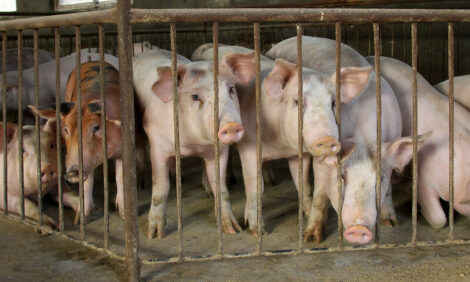



Anuga 2013: VION Contributes to Improved Animal Welfare
GERMANY - VION takes a lead in improving animal welfare at Anuga 2013.VION is very aware of the potential market demand for products that promote animal welfare. The company is at the cutting edge of the Beter Leven programme, in the Netherlands. What’s more, VION is the German Animal Welfare Association’s sole partner for their entry-level animal welfare certification. The meat producer’s involvement in collaboration with its farmers is unique in Europe.
“I was initially taken aback by the market forecasts,” admits Martin Houben, “but later I realised that VION had gauged retail industry demand and judged consumer behaviour just right.” The 51-year-old from Ysselsteyn in Limburg province is one 35 Dutch pig farmers signed up by VION in early 2010 to a programme that saw them rear their livestock according to the Dutch Animal Welfare Association’s Beter Leven initiative.
In fact, the results rapidly outstripped the most optimistic of predications on the part of animal welfare supporters, the meat industry and retailers. “In the second wave, we needed 95 farmers to meet demand for Beter products,” recalls Harold Theunissen, Concept Manager for the Good Farming Star Programme at VION. “Today, the total number of participating farmers is 150, raising a million pigs annually in accordance with Beter Leven criteria.”
Marijke de Jong-Timmermann from the Dutch Animal Welfare Association is not surprised by the burgeoning popularity of Beter Leven products amongst Dutch consumer.
“There has traditionally been strong public interest in animal welfare in this country,” she explained.
However, the main driver of this European-wide trend has been the retail industry.
“The supermarket chains can tell the famers and the meat producers what they want, they can explain the advantages to the consumer, and can highlight and promote Beter Leven products in their shops,” she added.
And that is exactly what they are doing, with great success.
Today, 13 of the 16 largest retailers in the Netherlands, including Albert Heijn, Jumbo and Plus, stock products such as pork, beef and poultry with the Beter Leven label. In fact, since 2011, meat sold in case-ready packs at market leader Albert Heijn has been exclusively sourced from farmers who uphold the new animal welfare standards. As a result of the retail industry’s initiative, sales of these “animal-friendly” products skyrocketed by fully 47 per cent in just one year, from €311.7 million in 2011 to €458.3 million in 2012. This represents 10.1 per cent of all meat sold in the country. And now the bar is to be raised again. Dutch retail industry association CBL has announced its intention to ensure all meat sold via its members fulfils Beter Leven criteria by 2020.
VION Food supports animal welfare in Germany
Buyer behaviour in Germany is also becoming increasingly critical. Consumers are no longer taking the “get more for less” approach. Instead, they are becoming more discriminating, prioritising quality, sustainability and local produce over price. And animal welfare is having a greater impact on consumers when buying meat.
Three years ago, Dr Heinz Schweer, Director of Agriculture at VION Food Germany began work with scientists at respected research institutes the German Animal Welfare Association and representatives of the food retail industry to develop criteria to improve conditions for livestock.
“At VION, we are an engine of change.in Germany,” he says. Ten months ago, retailers Kaiser’s Tengelmann, Coop and Edeka Reichelt released the meat in selected pilot regions. In the first year of the programme, 15 certified farmers will rear approximately 40,000 pigs.
“We have achieved entry-level certification from the German Animal Welfare Association, so we can display their label on our packaging. That puts us in a unique position as a meat producer, says Dr Schweer. “Now it’s up to retailers and consumers to decide whether our hard work to ensure animal welfare pays off in Germany or not. But I think there is a good chance that in just a few years, 10-20 per cent of pork will be produced according to the label’s criteria. VION is setting the pace in animal welfare.
“No other programme has advanced beyond the theoretical stage. To date, our farms and slaughterhouses are the only ones that have been awarded the German Animal Welfare Association’s entry-level certification,” he added.
Supermarket chain, Kaiser’s Tengelmann, also signed up to the initiative upon its inception in January 2013.
To mark the occasion, Hans-Theo Hennes, the manager responsible for sourcing meat, welcomed Ilse Aigner, the Federal Minister of Agriculture, to the company’s stand at the International Green Week exhibition in Berlin. Initially, the retailer piloted the new meat products at test supermarkets. Following its success, the scheme was rolled out to practically all Kaiser supermarkets in Berlin and the state of Brandenburg. The new meat is now also being trialed in other parts of Germany, at Tengelmann outlets in the Rhine/Ruhr region, and in Upper Bavaria, around Munich.
“Twenty-two years ago,” explained Mr Hennes, “we blazed a trail with our bull’s beef programme, sold under the Birkenhof brand. And we intend to lead the way again for animal welfare.”
Thomas Schröder, President of the German Animal Welfare Association, believes there is always room for improvement, but overall, after 10 months, the results are positive.
“The farmers taking part are highly motivated, the retailers have taken significant steps in the right direction. Our aim was to implement immediate improvements for the animals, and we have succeeded in doing just that," he said.
In Mr Schröder’s opinion, it is crucial that consumers understand “that better animal welfare means higher cost; we need to encourage them to see meat with the welfare label as a viable option.” He is encouraging more farmers to sign up to the programme, and says the retail industry needs to play its part. “There are companies out there that could show a bit more flexibility,” he added.








